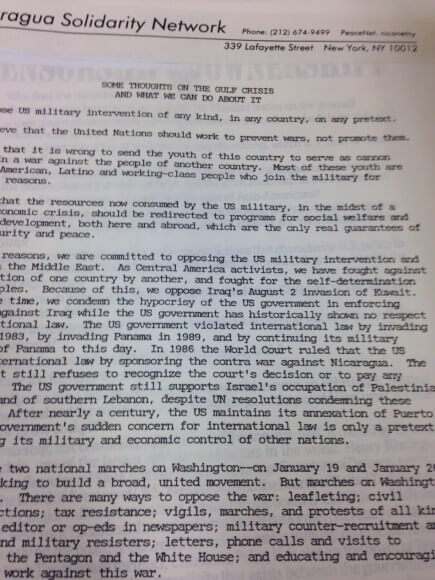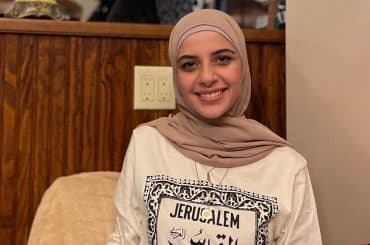
Bill de Blasio surrounds himself with hawkish supporters of Israel.
The likely next mayor of New York City appeared with the Jewish Community Relations Council last month to laud sanctions aimed at Iran and said that nobody would be fooled “until we see Iran move away decisively from the acquisition of nuclear weapons.” On October 9, he extolled the virtues of a rabbi who once called for God to strike Palestinians with a “plague” at a fundraiser populated by Syrian Jews.
But it wasn’t always this way. De Blasio used to be surrounded by critics of the Israeli occupation. He was a member of a Latin American solidarity group that was critical of Israeli human rights abuses in statements and flyers. While he was likely aware of the statements, he did not necessarily agree with them–activists I spoke with don’t remember him saying anything about Palestine back then. But the contrast between who his allies were in the early 1990s and who they are today couldn’t be more stark.
De Blasio is now firmly in the camp of progressive New York City officials who take a hardline stance in support of Israel and utter no criticism. The transformation of de Blasio from left-wing activist to likely next mayor wouldn’t have been complete without the current Public Advocate cozying up to supporters of Israel in New York City.
De Blasio’s political lurch from left-wing activist to hawk on Israel is “the state of New York City politics,” said Jane Guskin, who did Latin American solidarity work with de Blasio. While de Blasio has strongly defended his activism in support of Nicaraguan leftists, his campaign is silent on the statements made that criticized Israel. (De Blasio campaign spokesman Dan Levitan told me, “I don’t have a comment.”) The candidate seems to be running away from any Israel trip-wires, and recently told the Daily News he had no idea that a teacher he tried to help after an arrest in 2004 made statements sympathetic to the Palestinian cause.
As the New York Times’ Javier Hernandez reported last month, de Blasio was active from 1990-1991 in the Nicaragua Solidarity Network of Greater New York. The loose coalition of about 15 groups supported the Sandinista movement, a socialist group that took power in the Latin American country in 1979. By 1990, the Sandinistas had lost power in elections, but the U.S.-based activists still pressured the U.S. government to halt funding to the Contras, a group of rebels violently opposed to the Sandinistas. De Blasio worked with the New York-based activists until 1991, when he left for good.
While the Solidarity Network of Greater New York continued to focus on the proxy Cold War battle in Nicaragua, they also turned their attention to other causes, like opposing the Gulf War and criticizing the Israeli occupation. The mayoral candidate has been attacked from the right for his support of the Sandinistas–with some alleging the socialist movement was anti-Semitic–but little attention has been paid to the Solidarity Network of Greater New York’s actions in support of Palestine.
“To us [the issue of Palestine] was another example of U.S. intervention. It’s really that simple,” said David Wilson, a New York-based author who participated in Nicaragua solidarity activism with de Blasio. “Some of us wanted to get people who were in the Central America movement to start seeing what was going on there.” That was the case even before de Blasio came on board. As the crushing of the First Intifada escalated, the coalition endorsed marches against Israeli violence.
When the Gulf War erupted in 1991, the network swung into action, joining a coalition against U.S. bombing in Kuwait and Iraq. The network frequently tied their opposition to the Gulf War to their criticism of Israeli actions, pointing to what they called the hypocrisy of condemning the Iraqi occupation of Kuwait while funding Israel’s occupation. A look at the archives of the coalition, housed in a New York University library, provides a window into the prevailing sentiment on Palestine among the activists.
Attendees at a June 1990 strategy conference were informed of a “demonstration/march in support of Palestinian rights” taking place near the conference. The solidarity network coordinated “things with the organizers of the march” so attendees of the conference could join in.

In January 1991, during one discussion at a meeting about a letter against the Gulf War, a suggestion was made to connect the issue to Palestine. Handwritten revisions read: “The government still gives de facto support to Israel’s occupation of Palestinian territories and of Southern Lebanon.” In March 1991, Nica News, a newsletter put out by the coalition, published an article stating that “we mourn for the people throughout the world–Palestinians, Cubans, Salvadorans, Haitians and Nicaraguans–who are now more threatened than ever by the diplomacy of gunboats and smart bombs.” Another flyer from 1991 published by BuzzFeed‘s Andrew Kaczynski states: “In 1967, Israel occupied the West Bank and Gaza Strip. The US has never condemned that action. Instead, the US sends the Israeli government–which recently massacred 21 Palestinians in Jerusalem–$10 million a day.”

The de Blasio campaign did not respond to questions inquiring about what the candidate thought about Palestine back then and whether he has changed his mind. But in a follow-up e-mail, Wilson told me that “I really can’t remember whether Bill had anything to do with [the statements on Palestine], although he undoubtedly knew they existed.”

After de Blasio left Latin America solidarity work, he planted his feet firmly in the world of Democratic politics. He worked for the mayoral administration of David Dinkins in the early 1990s. He went on to become a Clinton administration official at the Department of Housing and Urban Development, before he took the helm of Hillary Clinton’s New York Senate run in 2000. It was then that he forged close ties to the New York Jewish community, according to Ezra Friedlander, an Orthodox Jewish political consultant who has known de Blasio for over a decade.
When the Jewish community reacted with outrage at Hillary Clinton’s 1999 embrace and kiss of Yasser Arafat’s wife, it was de Blasio who was “instrumental” in smoothing ruffled feathers, according to the New York Times. During the controversy, de Blasio “stayed in close contact with Assemblyman Dov Hikind, concerned that Jewish leaders might endorse her Republican opponent,” the reporter David Chen reported in August. Hikind, an ardent supporter of right-wing Zionism, is close to de Blasio and has expressed support for his mayoral campaign, though he endorsed Bill Thompson in the primary.
De Blasio continued his courtship of the Jewish community in Brooklyn during his campaign to represent the neighborhoods of Borough Park–a stronghold of Orthodox Judaism–Park Slope, Cobble Hill and more on the City Council. “Bill de Blasio is a guy who feels very comfortable in the Jewish community. It’s not a relationship he needs to develop,” Friedlander told me in a phone interview. “It’s been a part of his life for many years, and it’s a relationship that has grown over the years. There’s a strong bond. It’s a warm relationship.” Friedlander called de Blasio “very pro-Israel” and said that his past work on Nicaragua was “irrelevant.”
De Blasio is now hoping to turn those strong ties into a strong showing at the polls in November, when he goes head to head with Republican Joe Lhota, who is also making a bid for the Jewish vote. One Orthodox Jewish supporter of de Blasio’s, Leon Goldenberg, told the Jewish Week that he thought the candidate would do well among Orthodox communities, who usually vote in blocs. De Blasio has also garnered support from the progressive base of the Democratic Party, which includes a substantial portion of New York Jews. In September’s primary race, De Blasio won 39 percent of the Jewish vote, the most of any candidate.
De Blasio has gone hard-right on Israel during the campaign. In late August, he told the well-connected Orthodox radio host Zev Brenner that the New York City mayor “has to be a strong voice in support of Israel.” De Blasio also told Brenner that he has “stood up for Israel, whether it’s taking on the I think very, very wrongheaded movement to boycott, and disinvest from Israel. I’ve led the charge against that, whether you’re talking about the Park Slope Food Co-op or at Brooklyn College, I’ve stood against that divestment movement.” In 2012, de Blasio defended Israel as its air force rained down missiles on the Gaza Strip.
None of this rhetoric is a surprise to David Wilson, the former activist with the Nicaragua Solidarity Network of Greater New York.
“He’s a smart guy and he’s well-informed. And I can’t believe that he believes the things he says about the Middle East. It’s perfectly obvious that he’s saying the things New York City politicians say. I don’t know what he actually thinks, but he can’t think that,” Wilson told me. “There is a striking disparity between what he says now about Israel and what he thought about Nicaragua.”
The headline of this article is a nod to Ali Abunimah’s 2007 piece in the Electronic Intifada, titled “How Barack Obama learned to love Israel.”


Obviously, Bill de Blasio sees that being an Aipac stooge is good for business, as in his current business in seeking to become mayor of NYC.
And yes, what are the chances Bill de Blasio would now march in support of the rights of the Palestinians?
Who in his right mind would vote for de Blasio? The now-thankfully-dead Ovadia Yosef basically said that de Blasio, his wife, his kids, his family, are donkeys made only to serve Jews; de Blasio praised that piece of filth when he died. If he doesn’t have the character to stand up to a direct insult like that, what good will he be as Mayor?
How can anyone shake the hand of Lieberman? He is odious. I bet he smells like a jockstrap into the bargain.
So nothing has changed in NY politics since Truman v Dewey, eh?